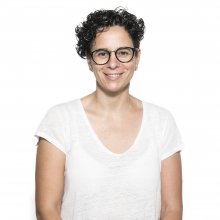Images
Participants

Contact

- This week the BBVA Foundation and IRB Barcelona have hosted the 41st Barcelona BioMed Conference entitled "Cancer Promotion: Understanding Cancer Promotion to Inform Prevention".
- More than 150 scientists from around the world have discussed the factors that contribute to the risk of getting cancer and their implication in the prevention of the disease.
Between 3 and 5 June, the BBVA Foundation and IRB Barcelona have hosted the 41st Barcelona BioMed Conference, entitled "Cancer Promotion: Understanding Cancer Promotion to Inform Prevention."
The event has brought together 150 international experts at the Casa de Convalescència (in Sant Pau modernist complex, Barcelona). The conference has been co-organized by Dr. Núria López-Bigas, ICREA researcher at IRB Barcelona, Dr. Allan Balmain, from the Helen Diller Family Comprehensive Cancer Center at the University of California San Francisco, and Dr. Paul Brennan, from the International Agency for Research on Cancer, in Lyon.
During the conference, the participants have discussed the latest advancements in understanding how cancer develops, focusing not only on DNA mutations but also on other factors that do not directly alter DNA.
These factors include obesity, alcohol consumption, and an unhealthy diet. Renowned international researchers have presented their latest findings and explored innovative technologies for studying the disease, with a strong emphasis on prevention.
"This conference has gone beyond genetics to better understand the dynamics and context that influence the onset and progression of cancer," says Dr. López-Bigas. "Research into the promoting factors is crucial for developing effective cancer prevention strategies," adds Dr. Brennan.
The promoter event
The 41st Barcelona BioMed Conference has highlighted the importance of cancer-promoting factors, which, while not directly altering DNA, affect the risk of developing the disease. Recent research has shown that stimuli such as obesity, alcohol consumption, and chronic wounds can "activate" cells with pre-existing mutations, allowing them to expand and form tumours.
This concept, known as the promoter hypothesis, suggests that genetic mutations alone are not sufficient to initiate cancer; an additional stimulus is required. Supported by studies in mouse models for over 70 years, this concept is being revisited with new technologies and approaches to improve disease prevention.
Key topics and prominent figures
The conference has addressed a wide variety of fundamental topics such as risk factors, the molecular mechanisms of cancer promotion, cell expansions in healthy tissues, and models for studying and preventing cancer.
These topics have been presented and discussed in talks, presentations, and networking sessions, providing a comprehensive insight into the challenges and opportunities in cancer research.
Among the attendees, notable figures include Professor Richard Peto (from the University of Oxford), an expert epidemiologist and a leading authority in cancer prevention. The IRB Barcelona researchers Dr. Direna Alonso-Curbelo and Dr. Alejo Rodríguez-Fraticelli, an ICREA researcher have also participated in the conference.
“This conference involves experts from a range of disciplines and we hope that the exchange of ideas and knowledge will help shape the future of cancer research,” concludes Dr. Balmain.
The organisers, Dr. López-Bigas, Dr. Brennan and Dr. Balmain, co-lead an international Cancer Grand Challenges project to study the early stages of cancer development.
Click here for more information about the conference and programme.
About IRB Barcelona
The Institute for Research in Biomedicine (IRB Barcelona) pursues a society free of disease. To this end, it conducts multidisciplinary research of excellence to cure cancer and other diseases linked to ageing. It establishes technology transfer agreements with the pharmaceutical industry and major hospitals to bring research results closer to society, and organises a range of science outreach activities to engage the public in an open dialogue. IRB Barcelona is an international centre that hosts 400 researchers and more than 30 nationalities. Recognised as a Severo Ochoa Centre of Excellence since 2011, IRB Barcelona is a CERCA centre and member of the Barcelona Institute of Science and Technology (BIST).






